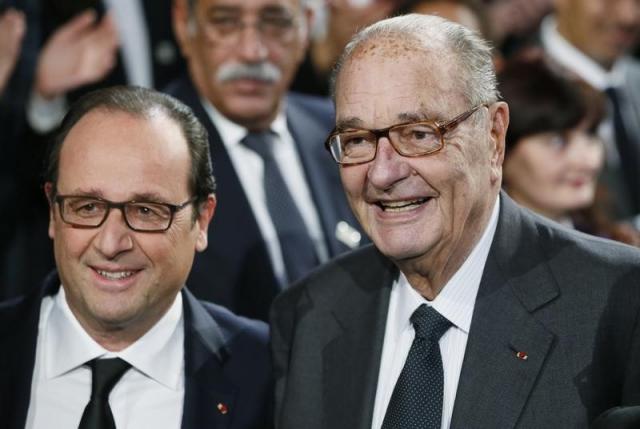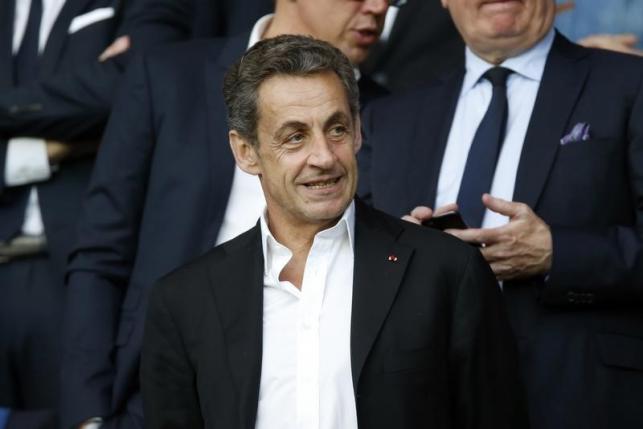www.aljazeerah.info
News, June 2015
Archives
Mission & Name
Conflict Terminology
Editorials
Gaza Holocaust
Gulf War
Isdood
Islam
News
News Photos
Opinion Editorials
US Foreign Policy (Dr. El-Najjar's Articles)
www.aljazeerah.info
|
Editorial Note: The following news reports are summaries from original sources. They may also include corrections of Arabic names and political terminology. Comments are in parentheses. |
France Summons US Ambassador Over 'Unacceptable' Spying by NSA on French Presidents
June 24, 2015
 |
 |
| French President Francois Hollande (R) and Prime Minister Manuel Valls (L) leave after the weekly cabinet meeting at the Elysee Palace in Paris, France, June 24, 2015. | Former French President, Nicolas Sarkozy, May 23, 2015 |
France summons U.S. envoy over 'unacceptable' spying
Wed Jun 24, 2015 6:24am EDT
PARIS | By John Irish and Elizabeth Pineau
France on Wednesday summoned the U.S. ambassador to explain allegations of what French President Francois Hollande branded "unacceptable" spying by the United States on French officials.
Hollande held an emergency meeting of ministers and army commanders after WikiLeaks revelations that the United States National Security Agency (NSA) had spied on the last three French presidents.
"France will not tolerate actions that threaten its security and the protection of its interests," a statement from the president's office said, adding it was not the first time that allegations of U.S. spying on French interests had surfaced.
"Commitments were made by the U.S. authorities. They need to be recalled and strictly respected."
The French Foreign Ministry summoned the U.S. ambassador to discuss the matter, a French diplomatic source said.
The U.S. Embassy declined to comment. A statement from the U.S. National Security Council said it was not targeting and will not target Hollande's communications. The statement did not say whether spying had taken place in the past.
While Paris and Washington have good ties in general, U.N. Security Council veto-holder France fiercely maintains its independence on foreign policy and over the last two years there have been moments of friction and irritation on both sides.
Hollande was disappointed by President Barack Obama's last-minute decision not to strike Syrian government positions in 2013. U.S. officials have frequently, in private, lambasted France's tough stance in talks over Iran's nuclear program.
MORE DOCUMENTS TO COME
The revelations were first reported in French daily Liberation and on news website Mediapart, which said the NSA spied on presidents Jacques Chirac, Nicolas Sarkozy and Francois Hollande during the period of at least 2006 until May 2012.
According to the documents, Sarkozy considered restarting Israeli-Palestinian peace talks without U.S. involvement and Hollande feared a Greek euro zone exit back in 2012.
The latest revelations of spying among Western allies come after it emerged that the NSA had spied on Germany and Germany's own BND intelligence agency had cooperated with the NSA to spy on officials and companies elsewhere in Europe.
WikiLeaks said on Twitter it would release more documents giving "further evidence as to U.S.' true goals in its mass espionage of France."
"We find it hard to understand or imagine what motivates an ally to spy on allies who are often on the same strategic positions in world affairs," French government spokesman Stephane Le Foll told i>TELE television.
Claude Gueant, Sarkozy's former chief of staff and one of the reported targets of the NSA, told RTL radio: "Considering the very close relationship we have with the United States, considering the fact we are extremely loyal allies, I feel like trust has been broken."
The documents included summaries of conversations between French government officials on the global financial crisis, the future of the European Union, the relationship between Hollande's administration and German Chancellor Angela Merkel's government, French efforts to determine the make-up of the executive staff of the United Nations, and a dispute between the French and U.S. governments over U.S. spying on France.
The documents also contained the cell phone numbers of numerous officials in the Elysee presidential palace, including the direct cell phone of the president, WikiLeaks said.
(Reporting by Michel Rose; Editing by Janet Lawrence)
NSA spied on French presidents: WikiLeaks
Tue Jun 23, 2015 7:59pm EDT
By James Regan and Mark John
The United States National Security Agency spied on French presidents Jacques Chirac, Nicolas Sarkozy and Francois Hollande, WikiLeaks said in a press statement published on Tuesday, citing top secret intelligence reports and technical documents.
The revelations were first reported in French daily Liberation and on news website Mediapart, which said the NSA spied on the presidents during a period of at least 2006 until May 2012, the month Hollande took over from Sarkozy.
WikiLeaks said the documents derived from directly targeted NSA surveillance of the communications of Hollande (2012–present), Sarkozy (2007–2012) and Chirac (1995–2007), as well as French cabinet ministers and the French ambassador to the U.S.
According to the documents, Sarkozy is said to have considered restarting Israeli-Palestinian peace talks without U.S. involvement and Hollande feared a Greek euro zone exit back in 2012.
These latest revelations regarding spying among allied Western countries come after it emerged that the NSA had spied on Germany and Germany's own BND intelligence agency had cooperated with the NSA to spy on officials and companies elsewhere in Europe.
"The French people have a right to know that their elected government is subject to hostile surveillance from a supposed ally," WikiLeaks founder Julian Assange said in the statement, adding that more "important revelations" would soon follow.
The documents include summaries of conversations between French government officials on the global financial crisis, the future of the European Union, the relationship between Hollande's administration and Merkel's government, French efforts to determine the make-up of the executive staff of the United Nations, and a dispute between the French and U.S. governments over U.S. spying on France.
The documents also contained the cell phone numbers of numerous officials in the Elysee presidential palace including the direct cell phone of the president, WikiLeaks said.
Last week, WikiLeaks published more than 60,000 diplomatic cables from Saudi Arabia and said on its website it would release half a million more in the coming weeks.
SPYING AMONG FRIENDS?
Former NSA employee Edward Snowden created an uproar in Germany after he revealed that Washington had carried out large-scale electronic espionage in Germany and claimed the NSA had bugged Merkel's phone.
"While the German disclosures focused on the isolated fact that senior officials were targeted by U.S. intelligence, WikiLeaks' publication today provides much greater insight into U.S. spying on its allies," WikiLeaks said.
This includes "the actual content of intelligence products deriving from the intercepts, showing how the U.S. spies on the phone calls of French leaders and ministers for political, economic and diplomatic intelligence".
WikiLeaks said NSA intercepts showed that French President Francois Hollande called a secret meeting of his cabinet about the potential consequences of a Greek exit from the euro zone as early as May 2012.
It also said the Socialist Hollande, who at that point had been in power a few days, had been disappointed by a first meeting as president with conservative German Chancellor Angela Merkel and requested talks with leaders of the Social Democratic Party, her centre-left junior coalition partner.
"Hollande stressed that the meeting would be secret," WikiLeaks quoted an NSA intercept from May 22, 2012 as saying of talks he requested with "appropriate ministers" in his cabinet to discuss possible fall-out on France's economy and banks if Greece exited the euro zone.
In another intercept dated June 10, 2011, Sarkozy is said to have considered restarting Israeli-Palestinian peace talks without U.S. involvement.
An earlier one from 2008 has Sarkozy, widely considered in France to be pro-American, being critical of the U.S. government's handling of the financial crisis.
"The president blamed many of the current economic problems on mistakes made by the U.S. government, but believes that Washington is now heeding some of his advice," it said.
The French president's office was not immediately reachable for comment.
The French foreign ministry declined to comment on the WikiLeaks statement.
The U.S. State Department also declined to comment.
Hollande's office said on Tuesday the president plans to meet with his defense committee on Wednesday to discuss the WikiLeaks statement.
Michele Alliot-Marie, former defense and foreign affairs minister under Chirac and Sarkozy, told France's iTele TV channel that France had long known that the U.S. had the technical means to try to intercept conversations.
"We are not naive, the conversations that took place between the defense ministry and the president did not happen on the telephone," she said. "That being said, it does raise the problem of the relationship of trust between allies."
(Additional reporting by Gregory Blachier, Julien Ponthus and John Irish; Editing by Toni Reinhold)
***
Share this article with your facebook friendsFair Use Notice
This site contains copyrighted material the
use of which has not always been specifically authorized by the copyright
owner. We are making such material available in our efforts to advance
understanding of environmental, political, human rights, economic,
democracy, scientific, and social justice issues, etc. We believe this
constitutes a 'fair use' of any such copyrighted material as provided for
in section 107 of the US Copyright Law. In accordance with Title 17 U.S.C.
Section 107, the material on this site is
distributed without profit to those
who have expressed a prior interest in receiving the included information
for research and educational purposes. For more information go to: http://www.law.cornell.edu/uscode/17/107.shtml.
If you wish to use copyrighted material from this site for purposes of
your own that go beyond 'fair use', you must obtain permission from the
copyright owner.
|
|
|
|
||
|
||||||


